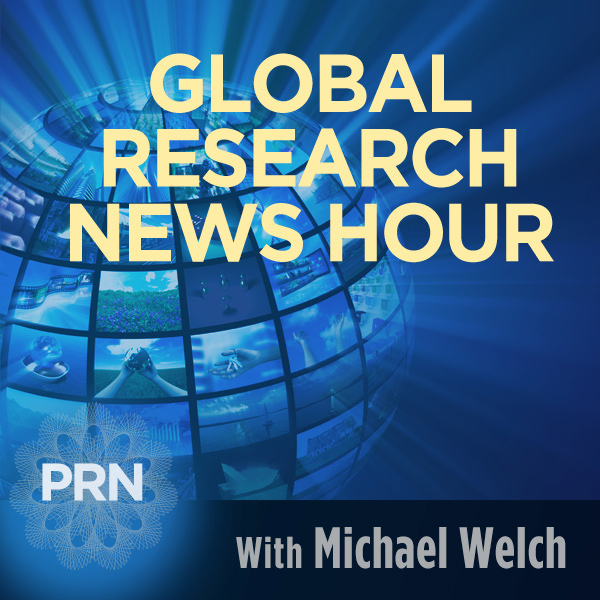Episodes

Monday May 20, 2013
Global Research News Hour - 05/20/13
Monday May 20, 2013
Monday May 20, 2013
Globalization Watch: Stop the Trans-Pacific Partnership (TPP)
“Through this agreement, the Obama Administration is seeking to boost U.S. economic growth and support the creation and retention of high-quality American jobs by increasing exports in a region that includes some of the world’s most robust economies and that represents more than 40 percent of global trade.”[1] Statement from the Office of the United States Trade Representative “I think we need to look at the Trans-Pacific Partnership as the neo-liberal arm of the US pivot at Asia. So we have all these countries in South East Asia that basically have more incentive to do business with China….Many policy papers state the importance of South-East Asia in …counterbalancing the influence of China in the region. So that is what I perceive the TPP to be.” Nile Bowie Lost in the wake of headlines about controversies surrounding Canadian Senators’ housing and living expenses and allegations of a Toronto big city Mayor ailing from an apparent crack addiction, is the important negotiations on a major trade and investment deal taking place in Lima, Peru this past week. The Trans-Pacific Partnership (TPP) had its origins in the 2005 Trans-Pacific Strategic Economic Partnership Agreement or the P4 which involved the countries of Brunei, Chile, New Zealand, and Singapore, and was aimed at liberalizing trade in those countries. [2] This deal was expanded in 2008 to include the US in negotiations and by 2009, the TPP began its first round of talks. [3], [4]. There are currently twelve negotiating partners in this comprehensive pact. In addition to the P4, and the US there are Australia, Peru, Vietnam, and Malaysia, with Mexico and Canada having joined the negotiations last October and Japan jumping on board in March. [5], [6] TPP is the latest in a string of numerous free trade agreements that proponents say will generate increased economic activity between and within countries thereby leading to greater prosperity for citizens. [7] Critics of the North American Free Trade Agreement, and its numerous successors argue however that these agreements really are not about trade. They are mechanisms by which corporations with international reach can overcome barriers, regulations, and other restrictions on their profit-making activities. [8] Three critics from three separate countries explain their concerns in this week’s instalment of the Global Research News Hour. Stuart Trew, Trade Campaigner for the Ottawa-based Council of Canadians provides his group’s analysis not only of the TPP, but also the Canada-EU Comprehensive Economic and Trade Agreement and the Canada-China Foreign Investment Protection Agreement (FIPA). Kristen Beifus of the Washington Fair Trade Coalition dissects the impacts of free trade on Americans and the concerns specific to the TPP. Kuala Lampur-based Nile Bowie provides his analysis of TPP in terms of its impacts on Malaysia where elections have recently been held. His commentaries on TPP appear on the globalresearch website. References 1. http://www.ustr.gov/about-us/press-office/fact-sheets/2011/november/united-states-trans-pacific-partnership 2. “Trans-Pacific Strategic Economic Partnership Agreement” 2005 http://www.mfat.govt.nz/downloads/trade-agreement/transpacific/main-agreement.pdf 3. Daniels, Chris (10 February 2008). “First step to wider free trade”. New Zealand Herald. 4. US TRADE Representative TPP Round Updates; http://www.ustr.gov/tpp 5. “Mexico: Unexplored opportunities”. TPP Talk. New Zealand Ministry of Foreign Affairs & Trade. 10 October 2012. http://www.mfat.govt.nz/Trade-and-Economic-Relations/2-Trade-Relationships-and-Agreements/Trans-Pacific/1-TPP-Talk/0-TPP-talk-10-Oct-2012.php 6. Canada Formally Joins Trans-Pacific Partnership” (Press release). Foreign Affairs and International Trade Canada. 9 October 2012; http://www.international.gc.ca/media_commerce/comm/news-communiques/2012/10/09a.aspx?view=d 7) Dr. Claudio Loser, May 6, 2013; Where Trade Is Free, Powerful Economic Growth Is The Norm; Forbes.com. http://www.forbes.com/sites/realspin/2013/05/06/where-trade-is-free-powerful-economic-growth-is-the-norm/ 8) Margaret Flowers and Kevin Zeese, March 27, 2013, Truthout; http://www.truth-out.org/news/item/15353-transpacific-partnership-will-undermine-democracy-empower-transnational-corporationsVersion: 20241125


No comments yet. Be the first to say something!